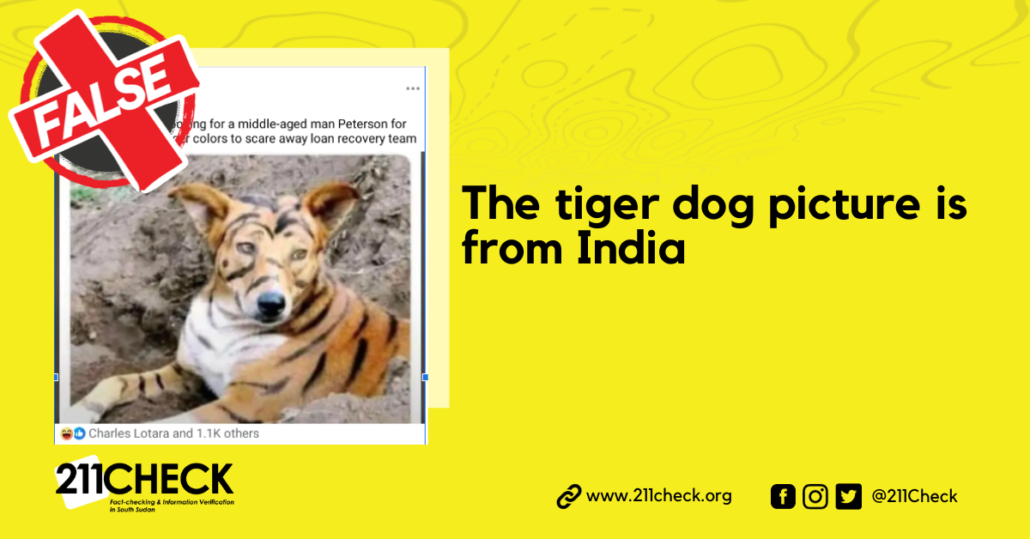Fact-check: Is this tiger dog from South Sudan or Uganda?
The tiger dog picture is from India.
Writer: Kei Emmanuel Duku
A social media picture posted on Juba Eye and Red Pepper UG that has gone viral on Facebook in South Sudan and Uganda is false.
In the post on Juba Eye, shared on September 25, 2023, the painted dog in Tiger colours is claimed to belong to a resident in the Jebel area of Juba, South Sudan, and police are already searching for the dog’s owner.
According to the claim, the alleged owner painted his dog in tiger colours to scare away individuals from coming to his home to ask for the loans he had borrowed.
The post was shared 73 times, with over 1,000 interactions, over 100 comments, and some over 70 shares by social media users.
The same picture and claim were used by RED Pepper UG on the same day, claiming that the owner of the painted dog is called Mucunguzi from Kyeggwa, and police are already searching for him for painting his dog in tiger colours. This post gained 286 likes, 43 comments, and 18 shares on this platform.
While the two Facebook posts are satirical, 211 Check looks at the origin of the image in the posts.
Claim Verification:
According to Tineye’s reverse image search, the picture was taken in New Delhi, India, on December 29, 2019, and the dog’s actual owner is Srikant Gowda, a farmer from Karnataka’s Shivamogga region.
The publication was done in Urdu, but with the help of Google Translate, it indicated that the dog’s owner decided to paint his dog in tiger colours to scare away monkeys destroying his farmland.
Similar searching was done using Google reverse image search, revealing the same results.
BestNewsGH.com published the story in December 2019 with the headline: A Desperate farmer paints his dog like a tiger to scare away invading monkeys.
Another source that used the picture is here.
Conclusion:
211 Check found that the photo that is being shared, claiming to be from Juba and Uganda, is false. The picture originated from the Indian state of Urdu and has been online since 2016..
A publication under 211 Check’s ‘Fact-check for a pay’ Initiative with Support from the International Fact-checking Network through the BUILD grant.
To ensure accuracy and transparency, we at 211 Check welcome corrections from our readers. If you spot an error in this article, please request a correction using this form. Our team will review your request and make the necessary corrections immediately, if any.
It’s vital to fight misinformation and disinformation in the media by avoiding fake news. Don’t share content you’re uncertain about. False information can harm and mislead people, risking their lives—Fact-check before sharing. For more details, visit https://211check.org/ or message us on WhatsApp at +211 917 298 255. #FactsMatter





